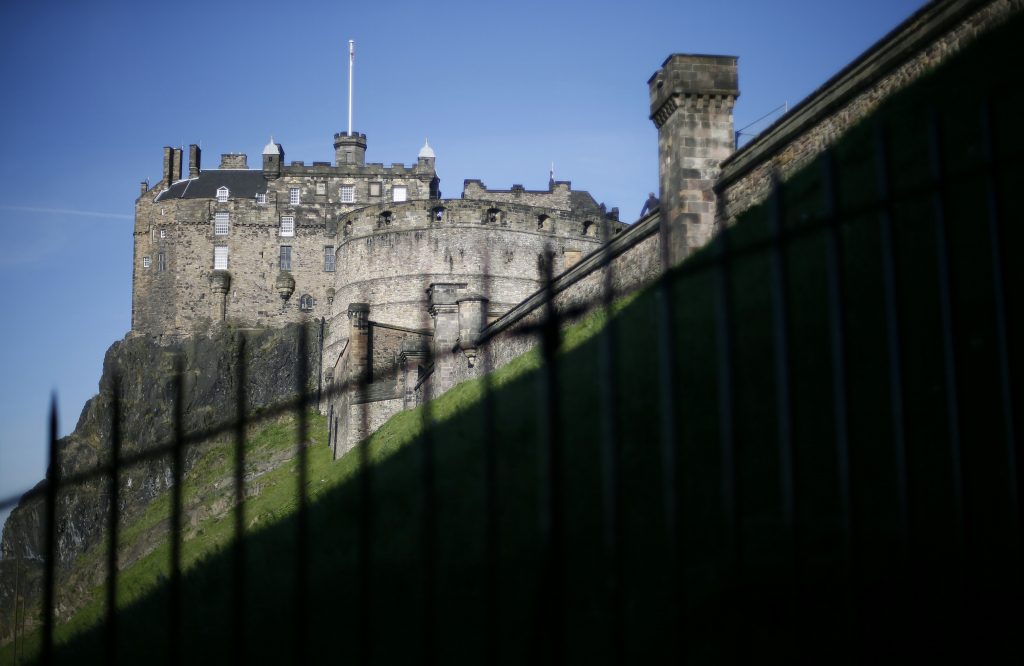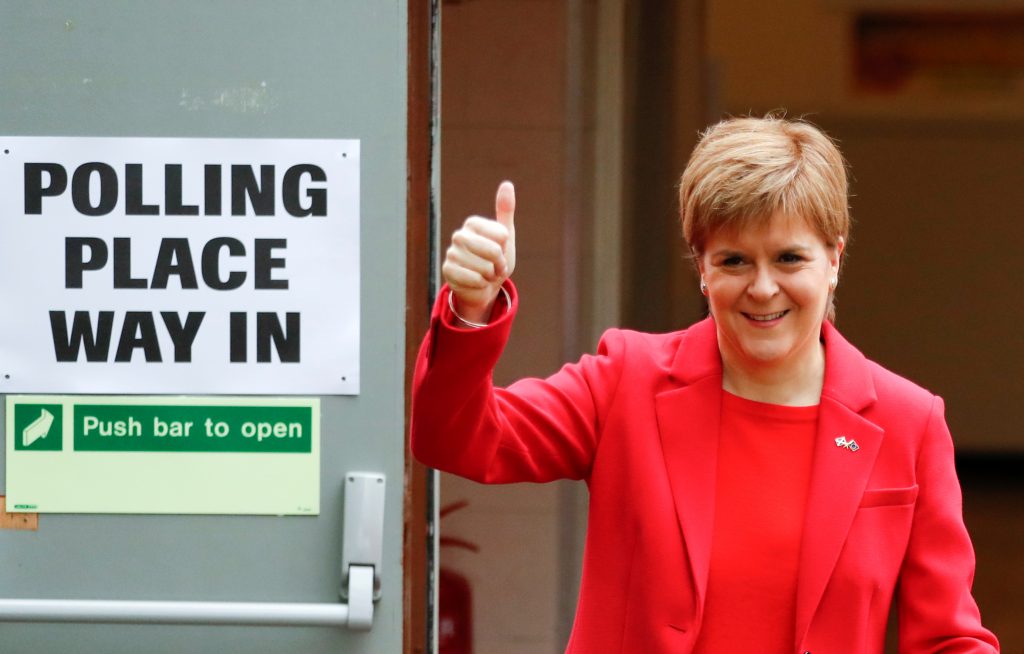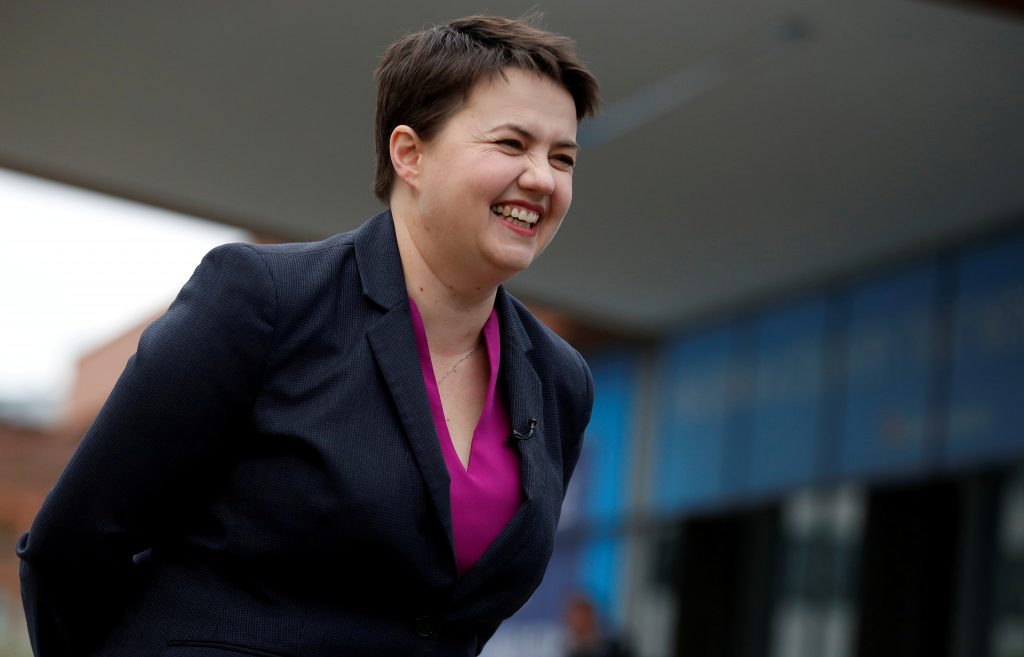After Brexit, will Scotland take the high road out of the UK?
Long Take: England’s rejection of the European Union could also lead to a divorce in the United Kingdom
Edinburgh at the beginning of August is a teeming, energetic, cosmopolitan place. The accents in the airport are as likely to be American, German, or French as they are Scottish or English. The city’s world-renowned annual cultural festivals begin, and Scotland’s capital explodes with activity. Walk through Grassmarket, where stand-up comedy, book readings, symphony orchestras, circuses, plays, folk music, and art exhibits all jostle for attention, and the billboards advertise shows from South Africa, Thailand, and Brazil.
A vacation was a chance to enjoy modern Scotland’s globalism and spectacular landscapes. The mountains and castles are as awe-inspiring as I remember. But in many ways, it has changed. Like Britain as a whole, Scotland is more open and international than thirty years ago with an open economy and a vibrant sense of itself that transcends tartan and shortbread.

On a trip to Scotland this summer I heard friends agonizing about politics. You can hear the alarm bells ringing from the busy streets of Edinburgh to the cool glens of Argyll and the windswept Western Isles. The United Kingdom (UK) is heading out of the European Union (EU): that much seems clear. Is Scotland also heading out of the United Kingdom?
A slim majority in the UK overall voted in favor of leaving the EU in the 2016―but a substantial majority in Scotland wanted to remain in the EU. Now, the prospect of Britain’s exit has triggered a sharp revival of support for Scottish independence. Just two years after Scots narrowly rejected independence by referendum, a second bite at the apple―IndyRef2―is being widely discussed, and one recent opinion pollshows it leading to a pro-independence result.
Scotland the brave and Brexit
Scotland’s renewed interest in independence springs partly from a desire to remain in Europe, but partly from distaste for the political climate in London. Boris Johnson, the new British prime minister, is the sort of English upper-class type who does not go down well in Scotland. “Johnson is the very incarnation of everything Scottish nationalists loathe in English right-wing Tories: foppish, rich, privileged, incompetent, xenophobic,” wrote historian Tom Devine in the Guardian. In contrast, Nicola Sturgeon, who leads the Scottish Nationalist Party, comes across to many in Scotland as a warm, modern, and engaged political leader. Class is relevant here (as it often is in the UK). Sturgeon is the daughter of an electrician and a dental nurse who came through the state school system. Johnson went to the elite Eton College. He seems anachronistic and backward-looking, and his surge to power on a wave of English anti-EU sentiment doesn’t resonate in the same way in Scotland.

The Scottish National Party has led the effort to separate from the United Kingdom since 1934. It lost the referendum on independence in 2014, but the revived campaign is meeting little political resistance. The Scottish Labour Party—historically a bulwark against nationalism—has all but collapsed in the last five years, and the deputy head of the UK Labour Party, John McDonnell, startled the party in Scotland by saying that Labour wouldn’t stand against another referendum. For many, the statement emphasized that the wind is shifting toward independence, and that politicians in London don’t view maintenance of the union as a priority. Broadly speaking, the liberal center in Scottish politics, which had doubts about nationalism, has put those doubts aside when the alternative is Brexit and Boris Johnson.
The Scottish Conservative Party leader was Ruth Davidson, also a warm and charismatic figure—but she resigned in late August. She had openly opposed Johnson’s approach to Brexit (though her resignation note cited family reasons).

My family spent a happy day with old friends near Edinburgh. One is English, one Scottish. They have spent much of their lives abroad and are now back in Scotland to raise their children. “I’m not a nationalist,” says the English husband. But the generally progressive nature of Scottish nationalism as he sees it, the efforts of Sturgeon to conciliate, and the political disaster in London all make him look more favorably on a second referendum. He still has doubts about nationalism―in general, and in its Scottish form―but at least this would be a route back into the European Union.
A Scottish nation, and a nation-state?
Would an independent Scotland be like Denmark―small, but deeply connected to Europe? It would be about the size of Ireland or Finland―richer than the former, less well off than the latter―though its economy would depend on the allocation of significant, but declining, revenues from offshore oil and gas.
What would it look like on the international stage? Scotland would immediately apply for membership in the EU and the United Nations straight away. Since 2012, the Scottish National Party has said it would also apply for NATO membership―though the SNP would ask for all nuclear weapons to be removed, which makes the transition perilous. Missiles on submarines that sail from a Scottish base at Faslane are the UK’s nuclear deterrent; removal would cause an upheaval in London and for Nato. Scotland has also traditionally provided much of the military muscle that has helped the British armed forces punch above their weight. It remains to be seen what would happen to the UK’s defense infrastructure, the Scottish regiments, and the Royal Air Force base from which quick-reaction forces patrol the North Sea against intruding Russian aircraft. The Scottish government is making hires in the area of international strategy, and even intelligence, as it moves toward a sense of what kind of nation Scotland would be.
In a union – but with whom?
An independent Scotland would be an aging country―the percentage of Scots claiming retirement pensions will rise by 25 percent over the next twenty-five years as deaths outpace births. So, it would rely on immigration to keep the economy in good shape. Even now, EU migrants account for half the hospitality workforce in the Highlands city of Inverness, for example. All the more reason to keep its doors open, according to opponents of Brexit.
But, which doors, and open to whom? Roughly half of the (non-Scottish) visitors to Edinburghare from England. Sixty percent of Scottish exports go to England. Scotland is deeply intertwined with the UK economy. And would Scotland join the euro, introducing an additional barrier to trade with the UK? Or stick with the pound, run from a foreign country? Or try to run its own currency, a stiff task for a small new nation in a tough world?
The numbers and economic logic don’t tell the whole story, of course. Scotland’s history of connections with Europeis rich and deep. We spent a fascinating day at Iona, a remote speck of an island on the West coast where Saint Columba brought Christianity from Ireland fourteen centuries ago. Scotland was a full participant―indeed, a leader―in the Enlightenment. It had a close relationship with France (the “Auld Alliance”) that was helpful to both in their conflicts with England. Relations between Scotland and Ireland, and between Scotland and Norway, stretch from the history of Christianity to Viking raids to wartime adventures to modern cooperation on fishing and oil.
Scotland has a global history, and a culture and identity woven from its interactions with the rest of the world. In a remote village church in Argyll, you can see memorials to generations of soldier Campbells who fought in Europe, North and South America, and India in the eighteenth and nineteenth centuries. One of them led Spanish troops against Napoleon Bonaparte, represented Britain in Egypt, and opened diplomatic relations with Colombia. In contemporary terms, Scotland’s asset-management industry is a global player, and Edinburgh is home to some of Europe’s largest fund management companies. Aberdeen is an energy-sector capital, with a steady flow of executives to and from Houston, Lagos, and Abu Dhabi.
Yet, that global experience has often been refracted through the relationship between Scotland and the British Isles. Scottish companies, soldiers, administrators, and missionaries staffed the empire, and benefited from it. Self-interest helped keep the union together until now; some Scots yearn to recover their own destiny, others feel that being yoked to the UK no longer carries the same benefits and may even be a threat to their prosperity.
That calculus is sharply contested by supporters of the union. The costs of disentangling from the UK are many, though they aren’t being widely discussed at the moment. “If leaving things is so bad, why should we leave the UK?” asks a friend at dinner in Stirling.
“The fact is many—most?—of us Scots are a mix of Irish, English and Scottish… two of my grandparents were from northeast England and two were from the west of Scotland—and their parents were all from Ireland. This is what helped us feel British,” says one Scottish friend now living in England.
Would Brexit and independence create a new land border for the UK and separate Scotland from its major market? That’s precisely the sticking point between the UK and Ireland over Brexit. The prospect of putting a hard border between the north and south again has galvanized opposition and become a rallying point for British Remainers and the EU leadership. It would be deeply ironic if an effort to make Scotland more globally connected instead left it more isolated, by putting in place a similar barrier.
The Scottish example
What would be the broader effects of an independent Scotland? It could hasten the efforts of the Basque Country and Catalonia to seek independence, though both have their own separate trajectories. It would also accelerate the political fragmentation of the European political space at a time when Europe could use more cohesion. The departure would leave a complex patchwork of relationships in the British Isles, with some states in the European Union and some outside it. It would presage a further shift in the relationship with Northern Ireland, and perhaps add momentum to Wales’ stalled independence drive. The result could even leave the English alone―which many, not least English nationalists, would welcome.
Many British institutions―the nationalized industries, the apparatus of government ownership and control―have been swept away by three decades of globalization, privatization, and deregulation. A few things remain―the monarchy, the armed forces, the British Broadcasting Corporation (BBC)―but there are fewer ties that bind. “The common sense of humor, the shared past, even the shared crisis!” says the Scottish friend in England. But she acknowledges that the decline of traditional industries like mining, steel and shipbuilding, which once fostered a sense of class solidarity and community, has affected national identity.
Under Prime Minister Johnson, “the world’s most successful multinational state is devoid of a unifying purpose powerful enough to hold it together and to keep four nationalisms—Scottish, Irish, English, and also a rising Welsh nationalism—at bay,” wrote former Prime Minister Gordon Brown recently. “We must rediscover the age-old virtues of empathy, solidarity across borders, reciprocity between nations and co-operation rather than conflict. These precious ideals—and a tolerant, inclusive and outward-looking Britishness—could not survive the divisiveness and chaos of a no-deal Brexit.”
“[T]he government must recognize that Brexit has opened up the (United Kingdom) to a new nationalist and separatist agenda and respond in kind,” wrote Lord Bew, a historian from Northern Ireland, for a Conservative think tank. “A new, modern case for the (UK) must be developed, based on the principle of consent.”
Independence can be prevented, but there’s a pressing need for the friends of the United Kingdom to restate the argument for unity. That has been lost, with many other things, in the scramble over Brexit in the last three years.
There are few inspirational figures who speak for unionism now in the way that previous generations of Scottish Labour and Conservative leaders did. With the UK lacking any sense of its own vision, strategy, or future, it’s hard to communicate why the component nations have a shared interest, a common destiny, or a sense of community. Without those, why should they bother to remain together?
Andrew Marshall is vice president of communications at the Atlantic Council. You can follow him on Twitter @consultifi
Image: The Union flag and The Scottish Saltire fly at the Scottish Parliament ahead of a referendum debate in Edinburgh Scotland, Britain March 21, 2017. REUTERS/Russell Cheyne